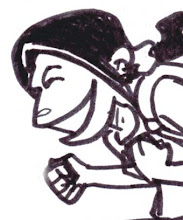Generations of vacuous pop music have come and gone, leaving the surviving populous with their pitfalls and lessons learned. And, just as Vietnam should have taught the world something in the subject of political warfare, but didn't, so did Disco torture the musical scene, leaving sonic scars for decades. The general message sent by the corpse of our trashy 70's hooker, though, is not as we'd expect. We do not hear from her cold lips: "Fill your ears with the immortal sounds of classics transcribed into rock 'n' roll beats and cool guitar melodies", or "Depth is greater than lifestyle 100% of the time, guaranteed." No. What we hear now from this strangled synthesized slut is "Disco sucks." A near decade of clubbing and poorly harmonized music can teach us nothing, it seems, but to avoid falling into EXACTLY the same trap. Nothing more, sometimes much less.
David Bowie stands as a perfect effigy of ignorance's bitter influence. Having shaken the world with his first wave of albums, he fell into a gorge longer and deeper than New Jersey. Apparently working for nothing more than drug money, we find that the musician's talent is stifled as he applies the trends of the time (DISCO) to his formerly ingenious brand of style in his lackluster 1975 album (lazy musicians take notice, here) Young Americans.
Beginning with the title track "Young Americans," Bowie shows evidence of a style of music already exploited, via the Philadelphia "Soul" movement. Displaying none of his prowess of the English language, he creates such witty vernacular-laden displays as:
You ain't a pimp and you ain't a hustler
A pimp's got a Cadi and a lady's got a Chrysler
Black's got respect, and white's got his soul train
Mama's got cramps, and look at your hands shake
I heard the news today, oh boy
I got a suite and you got defeat
Ain't there a man you can say no more?
And, ain't there a woman I can sock on the jaw?
Lyrics that I think Eazy-E might have stolen, early in his career.
With such creative trends as emo and hardcore floating around our weary ears, at present, it's important to note the failures of history, in order to prevent them from occurring again. Note the trend in butchering popular songs into seemingly era relevant covers. Bowie does this in his cover of The Beatles "Across the Universe," taking a concept rich tune, and converting it into an empty-headed disco rhythm. Apparently there is a 10 year wait-time on converting pop-tunes from the past into pop-tunes of the present, (i.e. Taking Back Sunday's "Message in a bottle," 311's "Lovesong," Cake's "War Pigs" etc...) surely we learn nothing from the tragedies that were and are.
As a final attempt to pimp himself to the public, Bowie offers us the last track on Young Americans, "Fame." In effort to salvage some of the love I typically have for the glam-rocker, I will say that he does a good job, when he means to, of taking a trashy style of music and making it very very mediocre. Fame is nothing more than the soul-less mechanized disco march that the coke crazy masses of the time were lusting after, and Bowie fed it to them with a British accent.
If you're looking for a Greenday-esque, taste-testing, sell-out, non-wonder album of the 70s, look no further than David Bowie's perhaps subconscious warning to the future regarding bland pop music, Young Americans.







